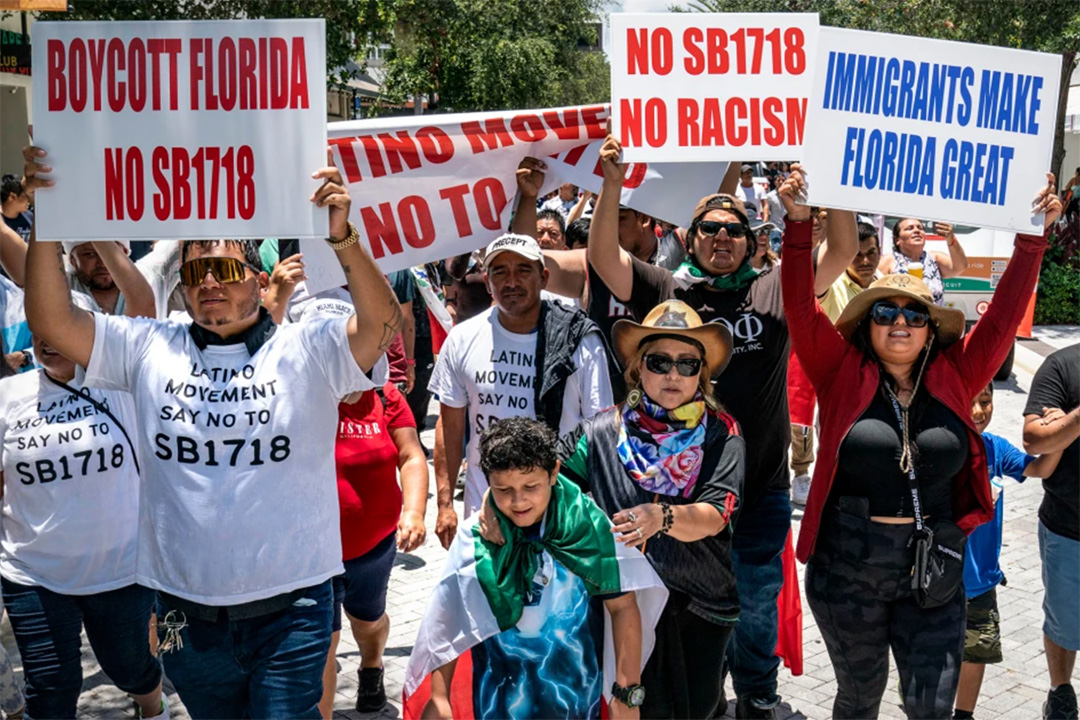Florida Governor Ron DeSantis has signed a new immigration-focused legislative package set to take effect on July 1st. The legislation, SB1718, aims to discourage immigration and has sparked fear among undocumented workers and employers in Florida.
Highlights of Florida’s new immigration law affecting undocumented immigrants:
- Driver’s License Restrictions: Individuals will be prohibited from driving with a license issued by another state that provides them to undocumented immigrants. Nonresident undocumented immigrants will face increased difficulty in applying for Florida driver’s licenses.
- Employment Penalties: Unauthorized immigrants knowingly using false identification documents or fraudulently using another person’s identification document to secure employment will be charged with a third-degree felony.
- DNA Sample Requirement: Those in the custody of law enforcement and subject to an immigration detainer will be required to submit a DNA sample.
- Hospitals and Immigration Status: Hospitals accepting Medicaid will include a question about a patient’s immigration status on registration forms and submit quarterly reports to the state’s healthcare agency.
- Local-Federal Cooperation: The law encourages collaboration between local law enforcement agencies and federal immigration authorities.
- E-Verify Mandate: Private employers with 25 or more workers must utilize the E-Verify system to determine employee eligibility. Non-compliant employers may face penalties starting in July 2024.
- Florida Bar Admission: Unauthorized immigrants will be prohibited from being admitted to the Florida Bar starting in 2028.
The recently enacted immigration legislation in Florida has generated significant impact and stirred widespread controversy. The law’s provisions targeting undocumented immigrants have triggered fear and uncertainty among this population, as well as among employers in the state. By analyzing the key aspects of the law, it becomes evident that its implications extend beyond the immediate scope, impacting various sectors and sparking intense debates regarding immigrant rights and the potential unintended consequences on Florida’s economy.
The driver’s license restrictions and increased difficulty in obtaining licenses for nonresident undocumented immigrants have limited mobility and created challenges for individuals seeking to meet their daily transportation needs. Moreover, the third-degree felony charges for unauthorized immigrants using false identification documents or fraudulently using another person’s identification to obtain employment have heightened the risks and penalties associated with seeking work opportunities.
The requirement for individuals in the custody of law enforcement agencies and subject to immigration detainers to provide DNA samples raises concerns about privacy rights and the potential for misuse or mishandling of personal genetic information. Additionally, the inclusion of a question about immigration status on registration forms in hospitals accepting Medicaid adds complexity to healthcare access and raises fears among undocumented individuals, potentially deterring them from seeking necessary medical treatment.
The collaboration between local law enforcement agencies and federal immigration authorities, facilitated by the new law, has drawn attention due to potential concerns regarding racial profiling, community trust, and the allocation of limited law enforcement resources. The mandate for private employers to use the E-Verify system and the penalties for non-compliance may impact businesses, particularly smaller enterprises, by imposing additional administrative burdens and potential financial repercussions.
Furthermore, the prohibition on unauthorized immigrants from being admitted to the Florida Bar starting in 2028 has raised questions about equal access to justice, professional opportunities, and the potential exclusion of talented individuals from contributing to the legal profession.
Critics and immigration attorneys argue that this legislation undermines the rights of immigrants, fosters an environment of fear and discrimination, and may have unintended consequences on Florida’s economy and social fabric. Meanwhile, proponents of the law contend that it is necessary to address concerns related to U.S. immigration and ensure compliance with federal regulations.
As the law’s implementation approaches, the ongoing controversy and the real-world impact on individuals, communities, and businesses will continue to unfold, shaping the narrative and raising crucial discussions about immigration policies, human rights, and the socio-economic landscape of Florida.


